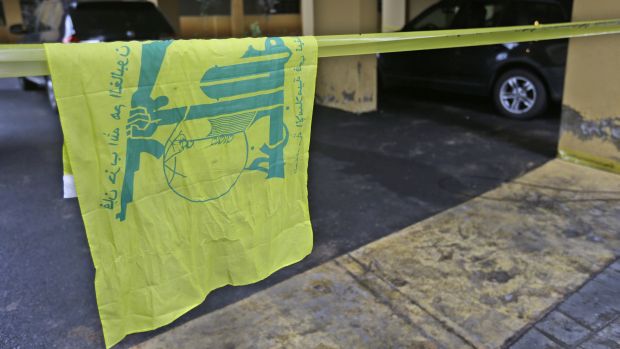
Undated file photo of Hassan Al-Laqqis, released by the Hezbollah Media Relations Office on Wednesday, November 4, 2013. (AP Photo)
Israel denied any role in the killing of Hassan Al-Laqqis, which Hezbollah said took place at around midnight in the southern Hadath district of the Lebanese capital.
A previously unknown group, Ahrar Al-Sunna Baalbek brigade, claimed responsibility for the attack in a message on Twitter. The group’s name suggested it had Lebanese Sunni Muslim links.
Hezbollah, which fought a 34-day war with Israel in 2006, has sent fighters into neighboring Syria to support President Bashar Al-Assad against mainly Sunni Muslim rebels, an intervention which has helped fuel sectarian tension in Lebanon.
A source close to Hezbollah said Laqqis was a military commander who had taken part in battles in Syria. He said he had been shot in the head with a silenced gun while in his car, in what he described as a professional operation.
Footage from the scene broadcast by Hezbollah’s Al-Manar television on Wednesday showed two bullet marks in a wall and muddy footprints it said had been left by possibly more than one assailant.
Hezbollah described Laqqis, who will be buried in the Beqaa Valley town of Baalbek later in the day, as “one of the leaders of the Islamic resistance” against Israel who had been frequently targeted by the Jewish state.
He had been with Hezbollah since its first days in the 1980s, when it was set up with Iranian support to fight Israeli troops occupying south Lebanon, and his son was killed in the 2006 war, Hezbollah said in a statement.
“The Israeli enemy tried to get to our martyr brother several times, in more than one location, but these attempts failed until this repugnant assassination,” it said.
Israel would “bear full responsibility and all the consequences for this heinous crime,” it said.
But Israel denied involvement. “This has strictly nothing to do Israel,” foreign ministry spokesman Yigal Palmor said.
“Hezbollah has made a fool of itself in the past with these automatic and groundless accusations against Israel . . . If they are looking for explanations as to what is happening to them, they should examine their own actions.”
The open role of Hezbollah fighters in the Syrian civil war, combined with a steady flow of Lebanese Sunnis joining the anti-Assad rebels, has fueled sectarian strife in Lebanon.
Car bombs killed dozens of people in Beirut in August and a twin suicide attack on the Beirut embassy of Hezbollah’s patron Iran killed at least 25 people last month.
An Iranian foreign ministry spokeswoman blamed Israel for that attack, but responsibility was claimed by a Lebanon-based Al-Qaeda-linked group, the Abdullah Al-Azzam brigades.
